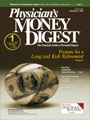Publication
Article
Physician's Money Digest
Sidestep the Common Investment Mistakes
Author(s):
Investors tend to express uncertaintyover their ability to manage theirportfolios during prolonged periodsof market volatility. But prudentinvestors understand that making soundinvestment decisions shouldn't be basedon the market's twists and turns. Rather,these decisions should stem from anunderstanding of investment fundamentalsand an awareness of the mistakesothers have made. Consider the followingcommon mistakes savvy physician-investorsshould avoid:
Unrealistic Expectations
There's nothing wrong with hoping forthe best from your investments. However,you could encounter serious long-termcash flow problems if you base financialplans on unrealistic assumptions.
According to an August 2004 Galluppoll, nearly one third of 800 investors surveyedexpected to generate profits of 10%or more in their portfolios next year. Howdoes that anticipated return compare withactual historical returns? Based on datafrom Standard & Poor's and the FederalReserve from 1926 to 2003, a hypotheticalportfolio divided equally among stocks,bonds, and cash would have had an averagetotal return of 7.3% annually. Whilethe composition of your portfolio may bedifferent from the portfolio in this example,it's important to maintain realisticexpectations to have the best chance atreaching your goals.
Note:
Familiarize yourself with the historicalperformance of appropriate investmentindexes or benchmarks and use theiraverage long-term returns to help maintainrealistic expectations. Pastperformance is no guarantee of futureresults. Stocks are represented by theS&P 500's annual total returns. Bonds arerepresented by the annual total returnsof long-term Treasuries (ie, maturities of10 or more years). Cash is represented bythe yields of 3-month Treasury bills.Indexes are unmanaged and cannot bedirectly invested into.
Hot Tips and Overtrading
Physician-investors tend to convincethemselves that recent investment performancerepresents the future. The problemwith chasing today's winning stocks ormutual funds is that by the time you hearabout the latest hot performers, you mayhave already missed out on the opportunityto participate in that price appreciation.
One solution:
Chasing past winners is closely correlatedwith overtrading, another mistake.Shuffling your investments too oftenincreases the chance that you'll buy highand sell low. Overtrading also generatesmore transaction costs and fees, which cutinto investment gains. Workwith a financial advisor. An experiencedprofessional may be able to help you stayfocused on your goals and avoid the urgeto trade frequently. In fact, studies havefound that investors who work with afinancial advisor tend to hold onto theirinvestments longer and realize betterreturns than do-it-yourselfers.
You might be surprised to find thatstrong and weak returns in one area havecaused a shift in your overall investmentstrategy that could affect your ability toreach goals or manage risk. Work withyour financial advisor to review your assetallocation once or twice a year to makesure that it remains in line with yourinvestment goals.
is the president of Apollonia Financial Services in
Elkins Park, Pa. All securities offered through Linsco/Private
Ledger, member SIPC. Past performance is no guarantee of future
results. The information presented is the opinion
of the author and not Linsco/Private Ledger. Mr.
Kleiman welcomes questions or comments at 800-242-1760 or info@apolloniafs.com. This article is
not intended to provide specific advice or recommendations
for any individual. Consult with your financial advisor if you have questions. This article
is not intended to provide specific advice or recommendations
for any individual.
Scott J. Kleiman
